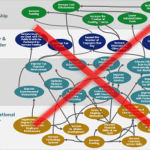
- Average time to wait for an appointment after requesting one—27 days
- Number of people who requested an appointment but didn’t get one—46,000
Not too reassuring is it. Would you leave your car or look somewhere else?
Some Veteran Administration facilities have a performance history like this. According to a recent review of the VA requested by President Obama, the agency is in deep trouble—average wait time for an appointment is 27 days and 46,000 veterans never got an appointment after requesting one. Some veterans died while waiting for appointments, although it’s not clear if the delays in medical attention contributed to the deaths.
At some VA facilities performance measurement data were misreported to make executives’ performance appear better than it was. Fraudulent performance reporting was used to help justify executive performance bonuses. (A department audit reported that three out of four facilities had a least one instance of false wait-time data and in some facilities two sets of books were being maintained.)
This type of behavior is called “gaming the system”. It’s a consequence of a culture overly focused on the wrong things (wait times) and a measurement system that emphasizes process performance over outcome performance. We shouldn’t be too surprised by the VA experience. When the wrong things are measured and incentivized, the wrong behaviors almost always result.
Focusing on the wrong measures and missing or minimizing the right measures created a climate of misreporting and deceit at some VA facilities, leading some executives to get credit for and bonuses based on reported good performance while all along the opposite seems to be true. Almost $300 million was paid out by the VA in 2013 for performance bonuses to employees, including nearly 300 senior leaders. (Maybe some of these executives should give their bonuses back to the VA for poor performance!) We’ll leave for another discussion the bigger question—what is systemically wrong at VA that encourages a behavior to keep two sets of books on performance?
Some critical questions come to mind. Where does customer satisfaction (veterans and their families are the customers) fit into the performance reporting and incentive equation? Shouldn’t satisfaction with medical service be heavily weighted in determining executive bonuses? If performance and reward are based mostly on process measures—like wait time—and wait time is being misreported, shouldn’t one assume that outcomes like effective medical care would suffer and that cheating to gain bonuses could occur?
How can an organization choose the “right” measures? Start with the end in mind (desired results/accomplishments) and work backwards through the processes that lead to the desired outcomes and to the resources required to produce the program outputs that yield the desired outcomes. Make sure the desired results are expressed in unambiguous language. Then test the developed measures to make sure you’re not measuring what doesn’t matter, or worse, measuring the wrong things and incentivizing the wrong behaviors. Whether you are a hospital, a car dealership, or any other business, government or nonprofit, the same principles apply for developing good performance measures.
The unintended consequences of doing measurement badly are, in the case of the VA, potentially life threatening. Can your organization afford to do performance measurement badly, or not at all?
You can learn more about developing measures that matter in our book, The Institute Way: Simplify Strategic Planning and Management with the Balanced Scorecard. You can order the book on our website or on Amazon.
Howard Rohm is President & Co-Founder of Balanced Scorecard Institute, a Strategy Management Group company. Howard is an author, performance management trainer and consultant, technologist, and keynote speaker with over 40 years’ experience.





